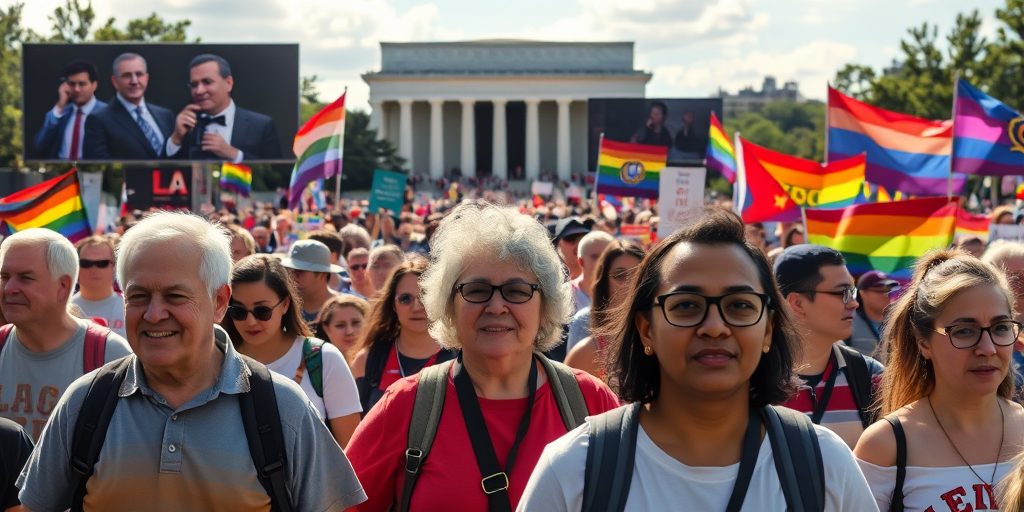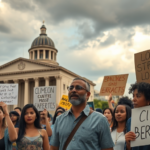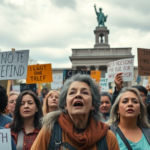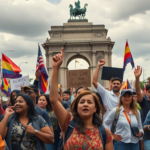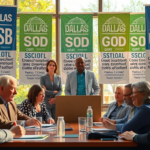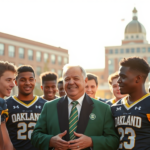Aging LGBTQ+ Community Faces Generational Divide in Fight for Equality
In an era marked by rapid social change, the aging LGBTQ+ community grapples with maintaining visibility and relevance amid evolving struggles for equality. This demographic faces unique challenges that both underscore their pioneering efforts in the past and highlight current community dynamics. From navigating isolation to challenging generational divides, the issues confronting older LGBTQ+ individuals are multifaceted yet deeply interconnected.
A Legacy from the Past
David Perry, a former resident of Washington D.C., recalls life as an openly gay man in the 1980s. Living discreetly was a necessity, as societal pressures compelled many LGBTQ+ individuals to remain “in the closet.” Perry, who now resides in San Francisco, notes how the AIDS crisis profoundly impacted his generation, bringing a tangible awareness of mortality to the community.
“We were the generation that watched as a Billboard in Dupont Circle counted the lives lost to AIDS,” Perry reflects. “That crisis bonded us together in activism, but it also left a legacy of loss that impacts us even today.”
Challenges Facing Elder LGBTQ+ Individuals
Today, advocates highlight the quiet crisis of isolation faced by elderly LGBTQ+ individuals. For many, the societal invisibility of aging layers additional burdens upon existing struggles with loneliness and financial insecurity. Sophie Fisher, of Seabury Resources for Aging in Washington, points out that older LGBTQ+ people who once led the fight for equality find themselves overshadowed in today’s youth-centric Pride movements.
“They’re the trailblazers,” Fisher emphasizes. “Yet, they’re often forgotten amidst the more visible, youth-oriented celebrations.”
Community tensions also arise from the generational divide. Older LGBTQ+ individuals frequently notice younger generations taking current rights and protections for granted — freedoms that their predecessors tirelessly campaigned to achieve. Perry and others voice this observation, urging today’s youth to remember the foundational struggles of prior decades.
Innovations and Initiatives
Amid these challenges, initiatives like Mary’s House—a new facility for LGBTQ+ seniors—are emerging. Designed to offer inclusive elder care, such spaces provide much-needed respite from the risk of judgment or exclusion prevalent in traditional settings. Rayceen Pendarvis, a prominent D.C. performer and advocate, articulates the necessity of such initiatives.
“Our elders don’t deserve to be isolated from the community they’ve helped shape,” Pendarvis asserts. “Developments like Mary’s House are lifelines that help affirm their identities in their golden years.”
Despite these advancements, the struggle remains complicated by larger societal and political dynamics. Under the current political climate, older activists see a renewed need for advocacy and protest — drawing parallels to past battles for civil rights.
Cultural and Legislative Battles
Donald Trump’s administration has introduced measures perceived as an open culture war against transgender protections and the broader LGBTQ+ community. These developments create an urgency among both younger and older individuals to unify against regressive policies. Perry, alongside other activists, hopes for a resurgence in militancy rooted in historical models of activism.
“There’s a need to refresh our spirit of protest,” Perry states. “Our community must come together, across generations, to defend the hard-won gains that now face renewed threats.”
Community Reflections and Future Directions
As the community ponders its path forward, many hope that renewed activism will bridge generational gaps and reinforce communal bonds. As Christina Da Costa of SAGE suggests, “Solidarity can empower us to advocate effectively for each member, young and old, ensuring no voice goes unheard.”
For local residents eager to participate in this evolving dialogue, organizations across the country, such as Seabury Resources and SAGE, offer resources and advocacy platforms. These bodies aim to facilitate intergenerational understanding while actively lobbying for elder rights and protections.
Ultimately, the aging LGBTQ+ community’s ongoing struggles illuminate the intersectionality of past and present efforts for equality. By addressing isolation and rallying against generational divides, they aspire to create an inclusive, supportive future for all LGBTQ+ individuals—a legacy deserving of celebration, recognition, and continuity.
For further support and local resources, residents can contact Seabury Resources at (202) 797-0200 or visit their events hosted specifically aimed at connecting and supporting LGBTQ+ seniors.

